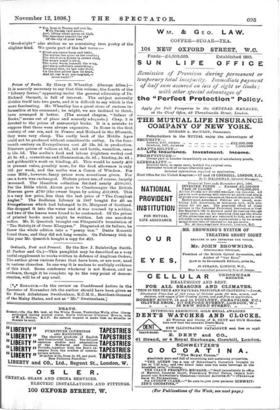CURRENT LITERATURE.
Lamia's Winter Quarters, by Alfred Austin (Macmillan and Co., 9s.), contains some charming verses and some pretty prose writing. It is further ornamented by nine full-page illustrations. The book is an account of the sojourn, impressions, and conversa- tions of four friends in Italy. These are the four, "The Poet" and Veronica his wife, Lamia, a beautiful girl, and a young man who describes them all, and calls himself "I." These people reveal themselves chiefly by their conversation, and we read a good many pages before we know who they are and in what relation they stand to one another. They talk a good deal of intentional nonsense—not very good of its kind—and much excellent sense. Here is a favourable specimen of the nonsense : "I hare a conscience, which I showed by declaring it at the frontier, as I heard it was contraband. I proved to be right ; it was confiscated, and I have got on very comfortably without it ever since." Their serious talk is often suggestive and instructive, and always cheerful reading. "The Poet" has a theory which we have all more or less adopted, and which he generally expresses by the words, "Cheerfulness is .!-,-ne most serviceable form of human charity." Florence and her history, of which we hear much, are fascinating subjects in the hands of a man who knows them well "how utterly out of place," said Lamia, "a character like Michelangelo seems in Florentine history ! Whereas Lorenzo di Medici is its very type and representative." "Do not forget," said Veronica, "that perhaps the three most austere human figures known to us were Florentines either by birth or by adoption : Michelangelo, Dante, and Savonarola." All the slight incidents of an uneventful stay are well related. An old priest who sells a Madonna out of his church in order to get money to buy a harmonium interests us much. He brings back the money neat day, and timidly asks if he may have the picture again, as the parishioners have missed it. The picture is returned, to the great disappointment of the buyers, who, however, put their "hearts and their purses" together, and present the priest with a harmonium, because, as Lamia said, "Why should every- body be disappointed ? " "The Poet" from time to time reads or recites his verses to his three friends. The poem on Mrs. Browning's grave gives us the most pleasure. Here is oll° verse :—
"Yes. here in Tuscan Boil you lie, With Tuscan turf above; And, lifting silent spires on high, The cypresses remind the oky Of the city of your love."
"Good-night" also strikes us as containing true poetry of the slighter kind. We quote part of the last verse :—
" Silent are rustic loom and lathe, The scythe lies quiet as the swathe; The wood, cove blinks in covert shed, The weary yokel is alwd.
The cevey warm beneath the w:ng, And sleep enfoldeth everything ; Forsaken love, its last tear shed, Cu the lone pillow lays its head, And all our woes are respited,—
elood-night l"







































 Previous page
Previous page